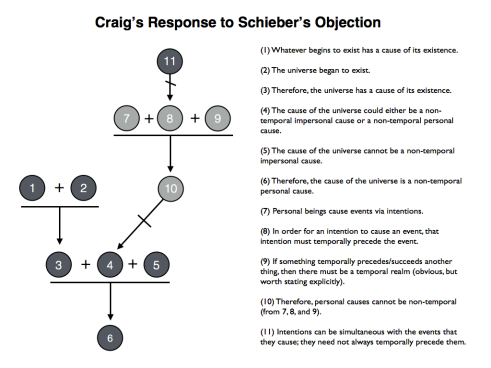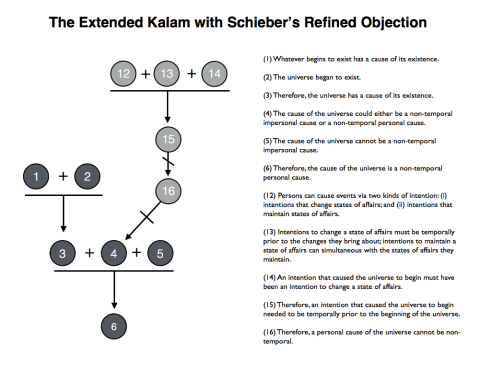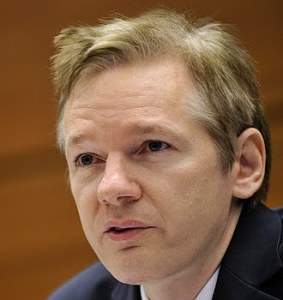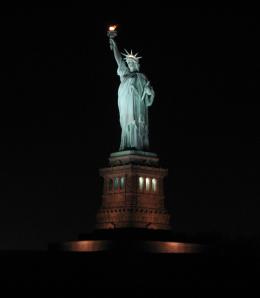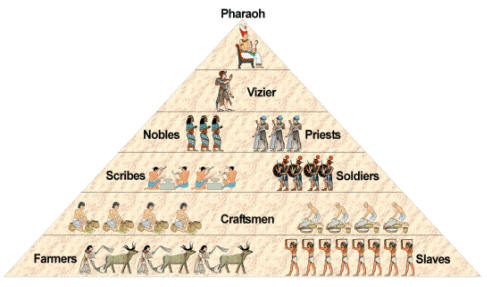I. Kalam Cosmological Argument
William Lane Craig formulates his argument as follows:
1. Everything that begins to exist has a cause.
2. The universe began to exist.
3. Therefore, the universe has a cause∴ The cause is a personal and timeless, conforming to the known definition of God.
Premise 1 rests on the ancient concept that all things that have a beginning have a cause. In premise 2, Craig states that the Big Bang singularity was the beginning of the Universe, and that the Universe therefore had a cause. He states that the cause must be singular (as opposed to an infinite series) because a true infinite temporal regress cannot exist. Justifying his summation using various arguments, from Occam’s Razor to the Fine-Tuning argument, William Lane Craig concludes that the first cause was a living agent, the Creator.
Because some Christian Apologists tautologically assume that the universe is defined as beginning at the Big Bang (which assumes the very thing they hope to prove), I’d like to clarify that I use the term “universe” to refer to any system with causal links to the current observable universe. This includes any region of spacetime preceding the Big Bang, any regions of space in different Hubble volumes, or any other physical system that has had a causal relationship with our current observable universe.
Objection 1: Actual Infinities and Set Theory
William Lane Craig uses set theory to support temporal finitude (Kalam Premise 2) by proposing to show that it is impossible to create an infinite temporal set via the successive addition of each present moment.
2.1. A collection formed by successive addition cannot be actually infinite.
2.2. The temporal series of past events is a collection formed by successive addition.
2.3. Therefore, the temporal series of past events cannot be actually infinite.∴ 2. The Universe has a cause.
William Lane Craig suggests that if infinite time exists, then it could be divided into moments (‘events’) of a particular finite duration. All of time would be composed of an infinite collection of these events. Our present moment would constantly be added onto this collection as it occurred. Craig contends that this creates a number of “absurdities” when applied to real objects. For example, he argues that an infinite temporal series could allow for the subtraction of infinite subsets, a phenomenon he contends would be absurd if it were real. Craig also tends to use variations on Whitrow’s Tristram Shandy argument, which essentially argues that infinite time would destroy the real difference between differing rates of movement in a physical system. The end result is that Craig claims to have shown that an “actual infinite” set of real events cannot exist.
A Stanford Encyclopedia of Philosophy article detailing the contentions between Mathematicians and Craig contains a number of salient points about the metaphysical possibility of an actual infinite. Additionally, John Bell argues that Whitrow’s Tristram Shandy argument is circular. I am going to ignore these for the moment and explore Craig’s description of time a bit more.
Objection 2: Reification Fallacies and the Eternally Enduring Present
Why does Craig claim that logical absurdities can prove infinite time cannot exist? Well, it is well-established that we can deny the existence of an object/process on the basis of an absurdity or paradox that would otherwise result if such a thing existed. A good example is Einstein’s insistence that matter cannot travel faster than light because it could result in a violation of causality, a clearly absurd consequence. By creating a symbolic description of the situation and then showing that the situation leads to physically absurd or unrealizable effects, Einstein has demonstrated the impossibility of causal violations. The point here is that there is a real precedent for believing that physically contradictory or physically paradoxical situations cannot exist in reality.
The core issue with Kalam is that it is unclear how Craig’s logical description of time “maps” to a real situation. Does Kalam assume ‘past events’ are physically real, or are they merely convenient abstractions representing particle configurations which no longer exist? The latter is argued by Presentism, a philosophical position which asserts that only the present exists. Oddly enough, Craig himself is a Presentist. For the sake of the argument, let’s grant that Presentism is true. So do past events actually exist? And if not, what does that imply for Kalam’s infinite temporal collection of past events? Luckily, Craig himself addresses this:
Now we may take it as a datum that the presentist can accurately count things that have existed but no longer exist. He knows, for example, how many U.S. presidents there have been up through the present incumbent, what day of the month it is, how many weeks it has been since his last haircut, and so forth. He knows how old his children are and can reckon how many billion years have elapsed since the Big Bang. The non-existence of such things or events is no hindrance to their being enumerated. Indeed, any obstacle here is merely epistemic, for aside from considerations of vagueness there must be a certain number of such things. So in a beginningless series of past events of equal duration, the number of past events must be infinite, for it is larger than any natural number. But then the number of past events must be ℵ0 (the first transfinite cardinal number), for ∞ (signifying a potential infinite) is not a number but an ideal limit.
So Craig maintains that under Presentism, past events are merely convenient abstractions representing configurations of matter/energy that we suppose must have existed at some point. He also maintains that the only obstacle in proving the existence of past events is only due to the epistemic limitations of the observer. But this is incorrect. Past events literally do not exist under a Presentist ontology. The obstacle is therefore ontological in nature.
This gets to the heart of the problem. Under Presentism, Time, when distilled to the most basic physical description, is merely the “smooth causal progression” of interacting matter and energy. Craig presents no obstacle to this smooth progression continuing, well, forever. And even the word “forever” fails to have meaning here…I merely mean to say that Craig provides no reason to suppose that the material progression of the universe creates any absurdities by enduring. “Past events” are simply a convenient mental abstraction, a description of either A) memories, or B) the extrapolation of information about a state of the universe other than the present, given knowledge of the present. Since Craig is erroneously basing his argument upon the idea that a collection of “past events” has some real place in the Presentist ontology, he is committing a reification fallacy.
The nature of a reification fallacy isn’t difficult to understand. Suppose that I argue “Computers perform calculations via boolean algebra using ones and zeroes…therefore ones and zeroes actually exist!”. Obviously this is incorrect; ones and zeros have no physical existence because they abstractly describe places where electrical current does or does not flow. Electrical current flows through electric circuits in a computer in such a way that we can use them to represent boolean operations. By reifying my mental model of boolean algebra, I mistakenly claimed that the abstract components of boolean algebra were real! My model about Boolean Algebra does not accurately reflect reality- it is merely a convenient linguistic description. I couldn’t base any physically meaningful argument on the premise that ones and zeroes actually exist, and if I did, I’d have to precisely demonstrate how my conclusion follows from these purely conceptual ones and zeroes. Similarly, Craig has to show how events (and absurdities) that do not even exist in his ontology can prove that physical causal regress has some sort of finite limit. If he cannot do this, his argument fails.
To summarize, the temporal events in Craig’s temporal collection do not represent anything real. Enumerating these events involves enumerating either memories or some other abstract, stored representation of object configurations that no longer exist. So in reality, under Presentism, the present is not “added” to a past series of events, but rather flows continuously. Craig’s contention that “reaching” the present must entail successively adding each moment of the present on to a set of “past” moments is merely the imposition of a human mental model of time. Craig is reifying his own notion of temporal becoming. Because we are under no obligation to grant the physical reality of Craig’s derived temporal absurdities, we are under no obligation to entertain that time is, in reality, finite.
Objection 3: Observer Bias and the Traversal of Eternity
A closely related but somewhat distinct objection to Craig’s modeling of time can be found in critics’ charges of observer bias.
As noted above, Craig often purports to demonstrate the absurdity of infinite moments by expressing the impossibility of enumerating or traversing an infinite number of moments. Addressing both of these:
1. Traversing an infinite number of moments: As noted in objection 2, this is a absurd objection to eternity. According to Craig’s own temporal philosophy, any observer traversing time is always “stuck” in the present progression of movement. It is therefore more apt to speak of the infinite endurance of an observer rather than traversal. An apologist might tweak their argument to address this objection, claiming that an observer could not *endure* forever. But the inability of an observer to endure forever does not prove that time is infinite. It merely proves that as “time” proceeds, the probability of an observer reaching a halting state (such as death or some other form of information loss) approaches 100%.
2. Enumerating an infinite number of moments: If an observer were to try and count all past moments, he would not be able to store the infinite amount of information necessary to do so. And even if he could, he would spend a future eternity counting past eternity. But…why should that make a difference? Modern set theory has shown that the notion of infinity is mathematically self-consistent, even if we cannot count an infinite set. So does an observer’s inability to count infinity disprove the possibility of an actual infinite collection?
This speaks to a more insidious problem: why posit an observer at all? Why is it important that an observer enumerate an infinite collection of moments, or count moments as he traverses them? Does this prove anything, other than that an observer has a finite lifespan and a finite memory capacity? There’s no “absurdity” here, other than Craig’s dependence on an observer to draw hard conclusions about what is and isn’t physically plausible. Infinite time (or any sort of associated infinite causal regress) will by definition be beyond the countability or concern of an observer. These are terrible examples on the part of Craig, because his desired physical conclusion (“time must have a finite beginning”) does not follow from the limitations of an observer.
Objection 4: “Big Bang” Singularity
William Lane Craig chooses the “Cosmological Singularity” (Big Bang) as his claim the the universe has a definite beginning. His analysis represents a laymen’s perspective of various cosmological theories, and much of his analysis is colored by his own lay intuition. He writes
Indeed, given the truth of the maxim ex nihilo nihil fit (out of nothing comes nothing), the Big Bang requires a supernatural cause. Since the initial cosmological singularity represents the terminus of all space-time trajectories, there cannot be any physical cause of the Big Bang. Rather, the cause must transcend physical space and time: it must be independent of the universe, and unimaginably powerful.
Craig supports this claim by citing a 2003 paper by Borde, Guth, and Vilenkin, which argues that cosmic inflation can only be a finite process, therefore reaching a singularity in the finite past:
Although such models were hotly debated, something of a watershed appears to have been reached in 2003, when three leading cosmologists, Arvin Borde, Alan Guth, and Alexander Vilenkin, were able to prove that any universe which has, on average, been expanding throughout its history cannot be infinite in the past but must have a past space-time boundary.
Unfortunately, Craig appears to have a serious misapprehension about the consequences of Borde, Guth, and Vilenkin’s theorem. Craig believes that the three are arguing that all of existence must have come into being ex nihilo from a singularity. There are three big problems with this:
1. The potential necessity of a singularity does not automatically imply an absolute beginning. A cosmological singularity is simply a location in spacetime where current physical models fail. In this case, the singularity is the spaciotemporal boundary of cosmic inflation, where the expansion of the current universe began. The theorem, by the authors’ own admission, says nothing other than that the universe must have begun expanding.
2. Singularities might not even exist in physical reality, since they represent the abstract mathematical artifacts of situations where physical models fail.
3. The authors suggest that a quantum fluctuation might have triggered the cosmological singularity:
What can lie beyond the boundary? Several possibilities have been discussed, one being that the boundary of the inflating region corresponds to the beginning of the Universe in a quantum nucleation event.
This contradicts Craig, who has argued that because such quantum mechanical events are not nothing, they do not represent creatio ex nihilo.
Given that Craig’s own sources so clearly contradict his physical support arguments for Kalam, we are under no obligation to seriously entertain them.
Objection 5: “Personal” Creator
William Lane Craig, in his debate with Justin Schieber, extended his argument to deduce a personal, timeless creator. Schieber objected that if a personal God created the universe, then God must have intended to create the universe, and since intentions precede actions, God must be subject to some form of temporal causality. If God is subject to temporal causality, then He is subject to the same infinite temporal regress that Craig argues against in his Kalam argument.
Craig responded that intentions do not necessarily precede actions, but can be contemporaneous with them:
Schieber responded that intentions that seek to change a condition must, by definition, precede the attempt to change the condition. This is actually in keeping with Craig’s general intuition that causality must preside over anything to do with the physical universe. Additionally, Craig, in response, cannot make a nonphysical defense (“God is Spirit and can do anything”) without rendering his physical argument worthless, because invoking a spiritual argument to ignorance would destroy his attempts to prove theism on a rational basis.
Schieber’s Response is mapped out by John Danaher:
Closing: Further counterarguments, further issues.
In the end, William Lane Craig offers the idea that, all things being equal, a single living creator is the simplest logical explanation. But I question, in light of continued physical evidence for material explanations, whether Occam’s Razor really favors supernaturalism over self-consistent physical models that have the power to accurately describe reality. After all, little of the Bible, our only good independent source of supernaturalism, is self-consistent, and even less of it depicts reality in an accurate manner. I fail to see a compelling argument here.

